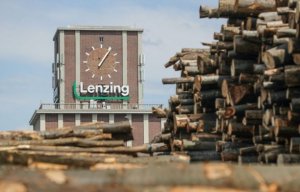
Lenzing raises outlook for current financial year
Solid revenue and earnings performance despite extremely tight cost situation.

5th May 2022
Knitting Industry
|
Lenzing, Austria
In the first quarter of 2022, the Lenzing Group, like much of manufacturing industry, was significantly affected by the extreme developments in global energy and commodity markets. A predominantly positive market environment and the strategic focus on specialty fibres such as those of the Tencel, Lenzing Ecovero and Veocel brands nevertheless ensured a solid revenue and earnings trend, with the effect of higher costs being largely offset.
Revenue grew by 25.7% year-on-year to reach EUR 615 million in the first quarter of 2022, primarily due to continued high demand for wood-based biodegradable specialty fibres and higher fibre prices. Specialty fibres’ share of fibre revenue currently stands at 73.3%. The earnings trend reflects trends in energy, raw materials and logistics costs, although the company’s continued focus on measures to improve structural earnings in all regions mitigated this negative effect.
Earnings before interest, tax, depreciation and amortization (EBITDA) decreased by 7% year-on-year to EUR 88 million. The EBITDA margin reduced from 19.3% to 14.3%. Net profit for the quarter grew by 14.3% to EUR 34.1 million, while earnings per share amounted to EUR 0.87 (compared to EUR 1.06 in the first quarter of 2021).
“Lenzing made a solid start to the 2022 financial year thanks to considerable efforts in an environment of sharply rising costs. Demand for our wood-based, biodegradable specialty fibres also recorded a positive trend in the first quarter,” commented Stephan Sielaff, Lenzing Group CEO.
“Strategically, we remain fully on track with the opening of our lyocell plant in Thailand and the commissioning of the pulp mill in Brazil, and we are very proud of this. We now aim to take the next step and continue our shift from a linear to a circular economy model. As a sustainability champion, we are aware that the textile and nonwovens industries cannot continue to operate as they do at present,” Sielaff added.

Business intelligence for the fibre, textiles and apparel industries: technologies, innovations, markets, investments, trade policy, sourcing, strategy...
Find out more